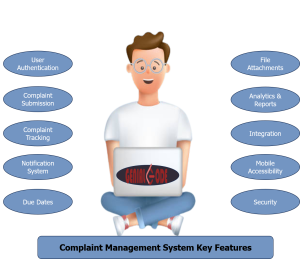Ensuring customer satisfaction is crucial in today’s competitive business landscape. Every organization or industry regardless of its size must handle customer complaints effectively to maintain a positive reputation and build long-term relationships. A Complaint Management System (CMS) can be a game changer in this regard, helping businesses efficiently receive, track, and resolve customer complaints. Here are some key features and benefits of a Complaint Management System in Python.
Complaint Management System Features
A CMS is a digital infrastructure that simplifies the process of handling customer grievances. Here are the frameworks and libraries used:
- User Authentication and Roles
- Complaint Submission
- Complaint Tracking
- Notification System
- Categorization and Prioritization
- Assignment
- Due Dates
- Comments and Notes
- File Attachments
- Search and Filters
- Analytics and Reports
- History and Audit Trail
- Integration
- Mobile Accessibility
- Security

Python Advantage
Python is an excellent choice for creating a Complaint Management System due to its simplicity, readability, and abundance of libraries and frameworks. Here’s why:
- Rapid Development
- Rich Ecosystem
- Scalability
- Community Support
Benefits of a CMS in Python
CMS developed in Python provides a multitude of advantages that make it a compelling choice for website and application development. Furthermore, Python’s user-friendly nature and versatility translate into an intuitive and adaptable CMS platform. Consequently, its benefits encompass several key areas. First, the user-friendly interface ensures that content management is accessible to both technical and non-technical users, reducing the learning curve and enabling more efficient content updates. Python’s rich library of modules and frameworks empowers developers to create highly customizable and feature-rich CMS solutions tailored to the unique needs of individual websites or applications. Moreover, Python-based CMS platforms exhibit exceptional scalability, effortlessly accommodating the growth of websites and applications without necessitating extensive overhauls. This scalability is a critical attribute for businesses anticipating expansion.
Furthermore, Python’s robust developer community ensures that CMS platforms receive regular updates, security enhancements, and new features. This ongoing support keeps the CMS up-to-date, secure, and competitive in a rapidly evolving digital landscape. Additionally, python-based CMS platforms often integrate built-in SEO features or plugins, simplifying search engine optimization efforts and thereby enhancing a website’s visibility and search engine rankings. Cost efficiency is another significant advantage, with Python being open-source and numerous Python CMS options available. This reduces development and maintenance expenses, making it an attractive choice for small businesses and startups seeking an effective content management solution. Lastly, Python’s reputation for strong security features contributes to creating a secure environment for sensitive data, instilling user confidence, and ensuring the protection of vital information.
A well-implemented CMS in Python offers several benefits:
- Improved Customer Satisfaction
- Transparency
- Efficiency
- Data-Driven Insights
- Legal Compliance
Building Your CMS in Python
To build a Complaint Management System in Python, you’ll require a team of skilled developers, a clear understanding of your organization’s needs, and a well-defined project scope. Moreover, it is worth considering using Python web frameworks like Flask or Django for developing web-based interfaces. These frameworks offer essential tools for building reliable and scalable applications.
A CMS in Python can be a highly beneficial tool for any organization that aims to improve customer satisfaction, streamline operations, and ensure transparency and compliance. Additionally, with proper planning and development, your CMS in Python can become a crucial component of your customer service approach, leading to customer happiness and a more efficient support team.








Leave a Comment